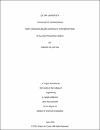Deep Learning Based Approach For Prediction Of Cloud Resource Needs
الملخص
Cloud computing allows scaling applications to serve dynamic and time-varying workloads and to avoid application performance degradation, while keeping low provisioning costs. But, resource demand of applications need to be determined beforehand. Therefore, accurate prediction of cloud resource needs is critical by enabling proactive scaling to efficiently manage cloud resources and to reduce the operational cost. Most of the exiting resource prediction approaches are based on the statistical analysis that employ shallow structure. As a result, the prediction model has poor ability to capture the intrinsic features in the workload data.
Deep learning has emerged as an alternative approach that promise to produce more accurate prediction. This project designed, implemented and evaluated a deep learning based approach for prediction of cloud resources using Long Short-Term Memory (LSTM) and Multilayer Perceptron (MLP). Moreover, a statistical prediction model Autoregressive Integrated Moving Average (ARIMA) is developed and evaluated. Expensive experimental studies were performed to evaluate the accuracy of deep learning prediction models compared to traditional ARIMA approach. The result of the experiments shows that the prediction accuracy of LSTM, MLP and ARIMA models depend on the pattern of the incoming workload. Specifically, the result shows that LSTM model outperforms other prediction models for periodic workload patterns, while ARIMA has better prediction accuracy for growing and unpredicted workload patterns.
DOI/handle
http://hdl.handle.net/10576/11360المجموعات
- الحوسبة [112 items ]


